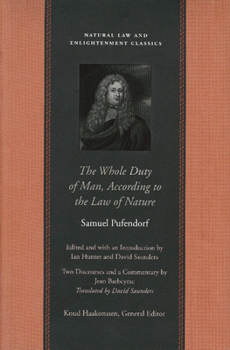The Whole Duty of Man, According to the Law of Nature
Select Format
Select Condition 
Book Overview
Samuel Pufendorf's The Whole Duty of Man, According to the Law of Nature suggested a purely conventional basis for natural law. Rejecting scholasticism's metaphysical theories, Pufendorf found the source of natural law in humanity's need to cultivate sociability. Samuel Pufendorf (1632-1694) taught natural law and was court historian in both Germany and Sweden. Ian Hunter is Australian...
Format:Paperback
Language:English
ISBN:086597375X
ISBN13:9780865973756
Release Date:February 2003
Publisher:Liberty Fund
Length:399 Pages
Weight:0.05 lbs.
Dimensions:1.1" x 6.0" x 8.9"
Age Range:18 to 10 years
Grade Range:Postsecondary to Grade 5
Customer Reviews
3 ratings
Crazy time law
Published by Ray ray , 3 years ago
Law for time travelers.
Great Early-Modern Pre-Kantian Political Reflection!
Published by Thriftbooks.com User , 20 years ago
Explanation:Pufendorf creates an abridged but complete system of his natural law 'juristic' philosophy. It is covered in two books located in this single edition. People who are interested in Thomas Hobbes, Hugo Grotius, and John Locke will find Pufendorf especially interesting. (Pufendorf was a major influence on Locke.)Summary:The book is written very lucidly but also written very tersely. This can be deceiving because there is a lot of thought packed into each sentence. Pufendorf starts out by explaining in the preface how he separates natural law from divine law and how natural law isn't necessarily god's law because god's law would only affect a being in the after life. He then creates the Sovereign and Civil Society argument out of this.He defines his natural law in human sociality -how humans relate to each other and their environment. Whether it be between man's self, his fellow men, society in general, human action, contracts, language, duty to god, and property, natural law is at work. Pufendorf covers all these topics in the first book. The second book covers natural law and institutions. The biggest institution covered is the state but Marriage and Family are also covered. Pufendorf also describes the function of civil laws as legislating on subjects undefined by natural law. Another function of civil society in Pufendorf's view is to promote natural law through civil law or at least respect it. Comments:Sorry for the uber-brief summary but the book is quite short. I had to say I really loved it and it was much easier to read than Hobbes. Reading this today you get the feeling that a lot of what Pufendorf is saying is self-evident but for the time period (i.e. 1672) this was mind boggling stuff. It is a fun read and very important if you want to understand the "early-modern" period of thought, especially that of the whole "War and Peace" argument. Philosophers of this period have this paranoid obscession with Civil War and Pufendorf is no exception.
I've become a Pufendorfian
Published by Thriftbooks.com User , 25 years ago
Pufendorf is one of the lesser known political theorists, but he is one of the most lucid that I have ever encountered. It is a wonder to me that he is not read in more college classrooms, as his style is accessible and lively and his commentary covers a tremendous range of topics. After reading, I've definitely become a Pufendorfist.






